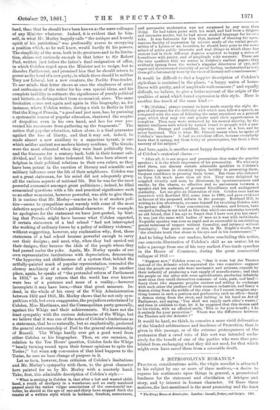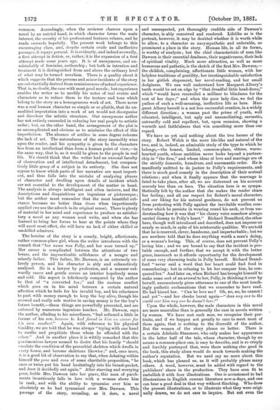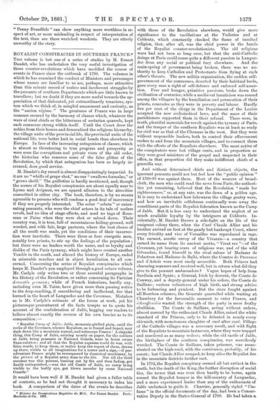A METROPOLITAN ROMANCE.*
PRA.CTICAL considerations aside, the virgin novelist is attracted to his subject by one or more of three motives,—a desire to express his sentiments upon things in general, a geometrical fondness for the statement and elucidation of intrigue and story, and by interest in human character. Of these three motives, the last-mentioned is the most promising and the least • The Dingy House at Kt:minion. London: Cassell, Petter, and Galpin. 1881.
common. Accordingly, when the reviewer chances upon a novel by an untried hand, in which character forms the main interest, the severity of his professional features relaxes, and he reads onwards hopefully. The present work belongs to this encouraging class, and, despite certain crude and ineffective passages, it repays perusal. It is evidently, and indeed avowedly, a first attempt in fiction, or, rather, it is the expansion of a first attempt made some years ago. It is of anonymous, and un- mistakably of feminine, authorship ; but both in intention and treatment it is distinguished from and above the ordinary level of what may be termed novelism. There is a quality about it which suggests that the persons and minor incidents of the story are substantially derived from reminiscences of actual experience. That is, no doubt, the case with most good novels ; but experience enables the writer so to modify his notes of real events and characters as to reduce them to the texture and tone which belong to the story as a homogeneous work of art. There never was a real human character so simple or so pliable, that its un- modified importation into a work of art would not disorganise and discolour the artistic structure. Our anonymous author has not entirely succeeded in reducing her real people to artistic order ; but, on the other hand, the arrangement of the plot is so uncomplicated and obvious as to minimise tbe effect of this imperfection. The absence of artifice in some degree redeems the lack of art. The naturalness of the story insensibly wins upon the reader, and his sympathy is given to the characters less from an intellectual than from a human point of view,—in the same way, that is, as it would be given to the people in real life. We should think that the writer had an unusual faculty of observation and of intellectual detachment, but compara- tively little grasp of a subject in its entirety. She does not appear to know which parts of her narrative are most import- ant, and thus falls into the mistake of analysing phases of character and dwelling upon details of incident which are not essential to the development of the matter in hand. The analysis is always intelligent and often incisive, and the descriptions and disquisitions are ingenious or picturesque ; but the author must remember that the most beautiful sub- stance becomes no better than dross when impertinently applied (we use the adverb in its original sense). There is plenty of material in her mind and experience to produce as satisfac- tory a novel as any woman need write, and when she has learned to bring her forces to bear at the points where they will exert most effect, she will have no lack of either skilled or unskilled admirers.
The heroine of the story is a comely, bright, affectionate, rather common-place girl, whom the writer introduces with the remark that "her name was Polly, and her nose turned up." Her career is complicated between the attentions of two lovers, and the impracticable selfishness of a meagre and miserly father. This father, Mr. Dawson, is an extremely un- lovely person, and his character is ably and exhaustively analysed. He is a lawyer by profession, and a manner out- wardly suave and gentle covers an interior hopelessly mean and cold. His aspect is felicitously compared by the author to that of "a converted fox ;" and the curious conflict which goes on in his mind between a certain natural affection which be feels for his invalid boy, and his reluctance to part with money enough to keep the boy alive, though his avowed and really sole motive in saving money is for the boy's future benefit,—these things are powerfully presented, and are enforced by numerous ingenious touches. Mr. Dawson, says the author, alluding to his miserliness, "had softened a little in favour of his son, because he had found in hint an excuse for his own conduct." Again, with reference to his physical timidity, we are told that he was always "trying with one hand to soothe and propitiate those whom he offended with the other." And in another place it is wittily remarked that this parsimonious lawyer seemed to desire that his family "should emulate the condition of the proverbial skeleton which dwells in every house, and become skeletons likewise ;" and, once more, it is a good bit of observation to say that, when debating within himself the pros and cons of some charitable proposition, "he once or twice put his hand hesitatingly into his breast-pocket, and drew it decidedly out again." After starving and worrying poor, feeble Mrs. Dawson into her grave, this man of parch- ments incautiously falls in love with a woman above him in rank, and with the ability to tyrannise over him as absolutely as he had tyrannised over Mrs. Dawson. This passage of the story, revealing, as it does, a novel and unsuspected, yet thoroughly credible side of Dawson's- character, is ably conceived and rendered. Lifelike as is the portrait, however, it may be doubted whether it is worth while- to allow, to a character so unsympathetic and unlovable, so prominent a place in the story. Human life, in all its forms, is worthy of analysis ; but the chief characteristic of men like- Dawson is their essential deadness, their negativeness, their lack. of spiritual vitality. Much more attractive, as well as more- humorous and pathetic, is the sketch of the first Mrs. Dawson,— the childish, complaining, affectionate little woman, with her helpless traditions of gentility, her inextinguishable satisfaction in her girlish elopement, her novel-reading, and her small dodginess. We can well understand how Margaret Albury's- teeth would be set on edge by "that dreadful little head-dress," which "would have reconciled a milliner to blindness for the rest of her days ;" and when the poor lady dies, we feel the pathos of such a well-meaning, ineffective life as hers. Maat;. garet Albury herself is a not less successful creation, in a widely- different direction ; a woman past the prime of youth, well educated, intelligent, but ugly and unconciliating, sarcastic, outwardly cold and repellent, but, upon occasion, showing a warmth and faithfulness that win something more than ow regard.
We have as yet said nothing about the two heroes of the story. Robert Welch is the more life-like and natural of the- two, and is, indeed, an admirable study of the type to which he• belongs,—the honest, limited, common-place, obtuse, warm- hearted youth, whose ambition never looks beyond a partner- ship in "the firm," and whose ideas of love and marriage are et. the strictly domestic, humdrum, and unromantic order. He is. manifestly unfitted to do justice to Folly's requirements, and there is much good comedy in the description of their mutual relations ; and when it finally appears that the marriage is. fated to take place, after all, we are distressed on his account scarcely less than on hers. The situation here is so sympa- thetically felt by the author that she makes the reader share- her feeling ; and all our respect for Robert's moral character,. and our liking for his natural goodness, do not prevent us from protesting with Polly against the inevitable woollen com- forter which he persists in wearing round his neck, or from un- derstanding how it was that "his cheery voice somehow always' carried dismay to Folly's heart." Richard Brandford, the other hero, though well introduced and described, does not impress us nearly so much, in spite of his aristocratic qualities. We are told that he is reserved, clever, handsome, and imperturbable ; but we- are nowhere told that he does anything worth a man's doing, or a woman's loving. This, of course, does not prevent Folly's loving him ; and we are bound to say that the incident is pro- bable enough, and further, that we accept it with the better grace, inasmuch as it affords opportunity for the development of some very charming traits in Polly herself. Richard Brand- ford "never said a word that her heart could find food in remembering ; but in refusing to let her conquer him, he con- quered her." And later on, when Richard has brought himself to. make some sort of an avowal to her, Polly, in thinking it oier by herself, unconsciously gives utterance to one of the most touch- ingly pathetic exclamations that we remember to have read. He had kissed her. "Can he love me ? Oh, no, no, he cannot ! and yet"—and her cheeks burnt again—" does any one in the world ever kiss any one he doesn't love ?"
Upon the whole, however, the male characters in this novel are more masculine than is generally the case in novels written by women. We have met such men, we recognise their por- traits, and if we happen not greatly to care to meet most of them again, that is nothing to the discredit of the author.. Butthe women of the story please us better. There is a certain Adelaide Stanmore, who only makes her appearance in the latter half of the tale, whose character, though by no means a common-place one, is easy to describe, and is so crisply and forcibly portrayed that, were there nothing else good in the book, this study alone would do much towards making-the author's reputation. But we need say no more about this book, which has pleased us, as it will probably please many others. A word, however, must be added with regard to the publishers' share in the production: They have seen fit to embellish it with four illustrations. One is accustomed to bad illustrations in English current literature now-a-days, and one- can bear a good deal in that way without flinching. Who drew the present illustrations, or to illustrate what they were origi- nally drawn, we do not care to inquire. But not even the
"Penny Dreadfuls " can show anything more worthless in re- spect of art, or more misleading in respect of interpretation of the text, than are these wretched woodcuts. They are utterly unworthy of the story.




































 Previous page
Previous page